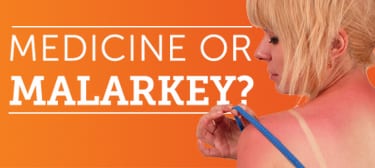Medicine or Malarkey: Do Aloe or Vinegar Really Help Sunburn?
June 14, 2016

We’ve all been there: it’s a gorgeous summer day at the beach. Maybe you applied sunscreen once in the morning but then started enjoying the sun so much that you forgot to reapply. You don’t even realize how badly you’ve been burned until you get home! So what should you do about that nasty burn? Let’s explore some common treatments.
Home Remedies to Treat Sunburn
There are a lot of goofy home remedies floating around the Internet that claim to treat sunburn. Here is the low down on some remedies that work — and some that don’t. Be sure to have your facts straight!
Aloe vera
Aloe vera is a product derived from the aloe plant. It has anti-inflammatory properties that makes it a first-line treatment for sunburn. Look for 100% aloe vera gel to relieve the burn (it’s commonly found in pharmacies). However, be aware that some people have allergies to aloe vera. It’s best to test the gel in a small patch of skin before slathering it over your entire sunburn.
- Vinegar
Although some people swear by a vinegar swear to relieve sunburn, this can actually make the problem worse. For blistered skin, a small amount of vinegar mixed with cool water can help to dry out the blisters. For a regular sunburn, however, the mild acidity of vinegar can further dry your skin, making the burn worse.
- Taking a hot shower
Some people believe that taking a hot shower takes some of the pain out of a sunburn. However, this can actually exacerbate the problem! Jumping into a hot shower will increase the diameter of your blood vessels, encouraging more blood to flow toward the surface of your skin. This just amplifies the pain of a sunburn. Instead, sink your burned skin into a cool bath to constrict blood vessels and get a bit of pain relief.
- Antihistamine cream
Antihistamine is a go-to treatment for itchy bug bites and certain rashes, but it will not help in case of a sunburn. Although sunburns cause redness and swelling, they are triggered through a different mechanism of action than antihistamines such as Benadryl can address.
- Products with vitamin E
Vitamin E is a micronutrient that has strong antioxidant properties. It can be particularly beneficial for skin and eye health. Look for a lotion that contains vitamin E to help repair your damaged skin.
- Taking an anti-inflammatory medication
Sunburn causes inflammation, which contributes to the pain. To reduce your inflammation levels, take an over-the-counter anti-inflammatory pill. Naproxen (Aleve) works well, as does aspirin or ibuprofen.
Of course, the best way to avoid the pain of a sunburn is to prevent yourself from getting one in the first place! Purchase sunscreen with SPF 30 or higher and reapply it every couple of hours to ensure that it continues to protect your skin. Keep in mind that you can still get sunburn on cloudy days or during “off peak” tanning hours, making it important to apply sunscreen every day as a preventative measure.
